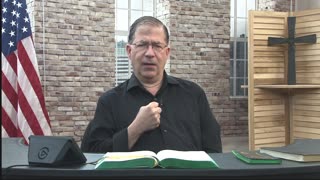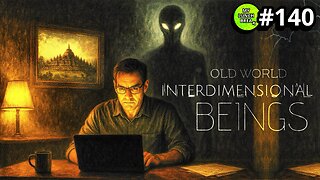Premium Only Content

Preaching on abortion, 31st Sunday, Year C, Fr. Frank Pavone of Priests for Life
Fr. Frank Pavone, National Director of Priests for Life, reflects on the Sunday readings for the 31st Sunday in Ordinary Time, Year C and their message about abortion.
For more information about what the Sunday readings, and the whole Bible, say about abortion, and for resources for your Church, see https://www.ProLifePreaching.org. You can order there the book “Proclaiming the Message of Life,” which contains these reflections for all the Sunday readings in the lectionary.
Wis 11:22—12:2
2 Thes 1:11—2:2
Lk 19:1-10
The Zacchaeus story shows our Lord’s eagerness to seek out those whom others are tempted to look down on. Zacchaeus would have been lost in the crowd because of his small stature, had he not climbed the tree. He was also looked down upon because of his role as chief tax collector. But Jesus sought him out, not only by giving him attention but by dining at his house.
Jesus breaks down the false barriers we place between certain kinds of people and others; he goes first to those who are pushed aside by the crowd.
The Church, through which Jesus continues to carry out his mission today, does the same thing, and therefore speaks up for those pushed aside by the crowd, especially the smallest of the small, the unborn.
Their lives, like ours, are not just the handiwork of God, but a continuous proof of his love. The first reading reminds us that at every moment God is sustaining each one of us with the breath of life. We would fall back into nothingness at once if God did not have his love focused on us in an uninterrupted way. To snuff out a life, therefore, whether of the born or the unborn, is a direct contradiction to God’s loving will, which sustains all things in being.
On the other hand, we cooperate with the life-giving love of God each time we reach out to those around us who may be unsure about how to handle their pregnancy, and give them the strength to love their unborn child. We do likewise when we strengthen those who care for the vulnerable, the disabled, and the dying. By helping one another grow in love for the weakest in the human family, we and they literally become more like God, for “how could a thing remain unless you willed it, or be preserved, had it not been called forth by you?’ (First Reading).
-
 30:15
30:15
Fr. Frank Pavone
12 hours agoRemaining True to Christ’s Teaching
18 -
 18:14
18:14
Her Patriot Voice
4 hours agoWho Is WORSE for NYC: Trump Girl or Socialist?
10K21 -
 LIVE
LIVE
SavageJayGatsby
3 hours agoSpicy Saturday with Mally! | Road to 100 | $300 Weekly Goal for Spicy Bites!
1,108 watching -
 LIVE
LIVE
FomoTV
5 hours ago🚨 Swamp Theater: FBI Raids Bolton 🕵 Still NO Epstein Files, Trump's Troops & the Red Heifer Hoax 🐂 | Fomocast 08.23.25
64 watching -
 6:04:40
6:04:40
Akademiks
8 hours agoRoc Nation & Meg Thee Stallion did a 7 HOUR Deposition with me. Drake Secret Kid Finally Revealed.
45.1K1 -
 24:19
24:19
Stephen Gardner
4 hours ago🚨BREAKING: FBI Raid of John Bolton’s House Reveals THIS!
47.4K108 -
 8:31
8:31
MattMorseTV
6 hours ago $1.02 earnedTexas just did the IMPOSSIBLE.
35.2K57 -
 24:39
24:39
MYLUNCHBREAK CHANNEL PAGE
1 day agoInterdimensional Beings at Borobudur
46.4K27 -
 12:42
12:42
Scammer Payback
1 day agoCalling Scammers who were Raided
24.2K11 -
 23:31
23:31
IsaacButterfield
17 hours ago $0.08 earnedThe Woke Mob Is Really CANCELLING Matt Rife For THIS…
22.3K16